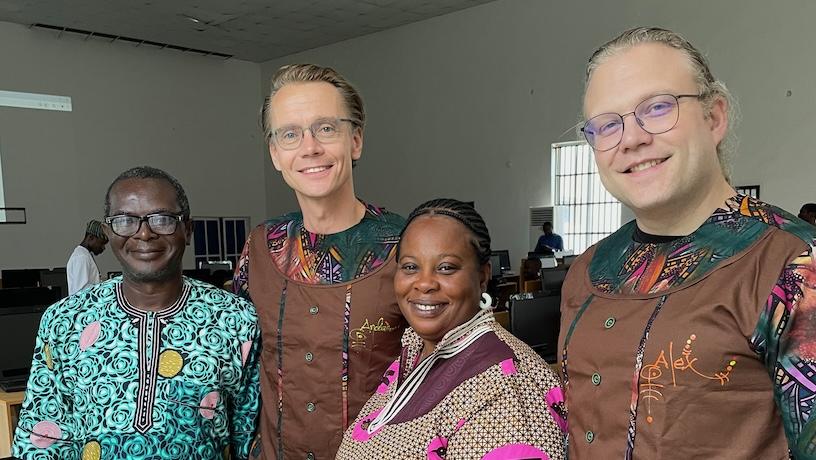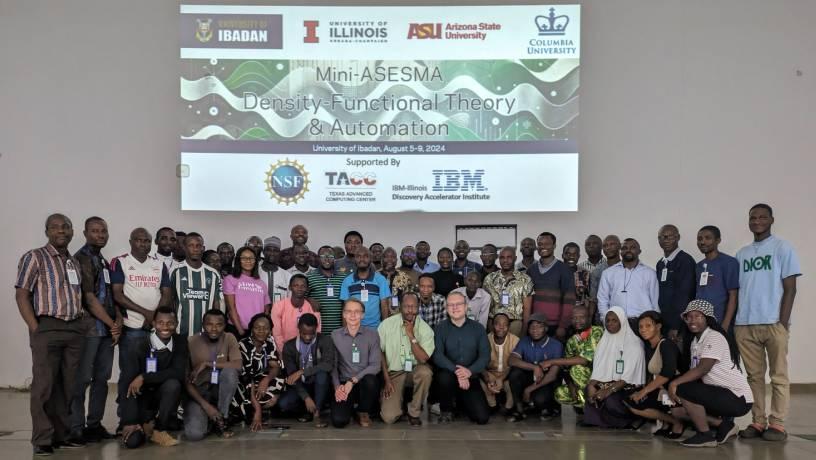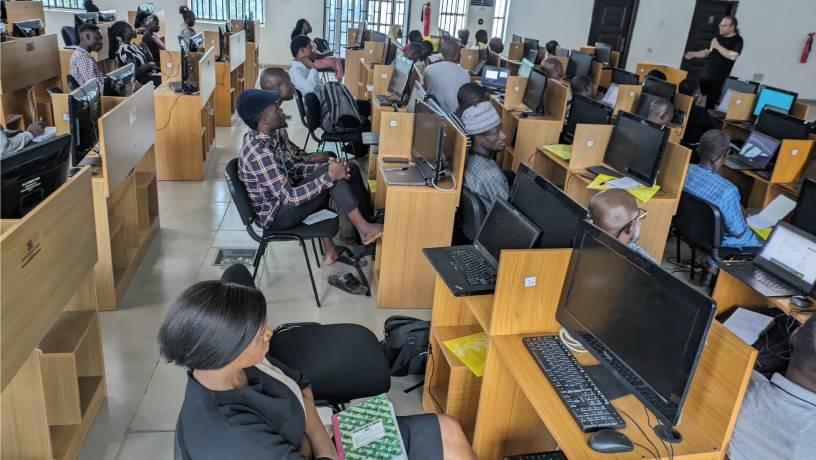Global Connections in Computational Materials: Bridging Knowledge Across Continents
This summer, Columbia Engineering's Alex Urban and colleagues extended their expertise in computational materials science to 50 students at the University of Ibadan, Nigeria
About the Author
Alex Urban is assistant professor of chemical engineering at Columbia Engineering. He is a computational materials chemist and is interested in materials for clean-energy applications, particularly in materials for batteries and fuel cells. Urban is a core member of the Columbia Electrochemical Energy Center and an affiliated member of the Columbia Data Science Institute.

Alex Urban (far right), assistant professor of chemical engineering at Columbia Engineering, with his collaborators at University of Ibadan.
The world is undeniably experiencing a digital revolution. With artificial intelligence frequently making headlines and smartphones being ubiquitous, applied engineering disciplines are harnessing these advancements through computer simulations and data science. Over the past five years at Columbia Engineering, I’ve been conducting research focused on developing computational methods for materials and process engineering, particularly in clean-energy applications, such as improving battery technology and creating more sustainable processes for mining and recycling.
This summer, from Aug. 5 to 9, my colleague André Schleife, professor of materials science and engineering at the University of Illinois at Urbana-Champaign, and I shared our expertise in computational materials science with some 50 students at the University of Ibadan in Nigeria. The program’s goal was to provide these students with essential skills for this emerging field. Houlong Zhuang, associate professor at the School for Engineering of Matter, Transport, and Energy at Arizona State University, supported the initiative remotely by coordinating access to a U.S.-based computer system for all participants.

The participants of the Mini-ASESMA at the University of Ibadan, Nigeria. In the center of the front row, left to right, are Andre Schleife, Omololu Akin-Ojo, and Alex Urban.
The digitalization of engineering offers significant opportunities for developing countries, as computer simulations do not require expensive, on-site laboratory equipment. Academic researchers, while they may not have access to cutting-edge wet chemistry labs, can still use computational resources from anywhere in the world. With the right knowledge, even a decade-old laptop can be sufficient to start.
This “mini” program was part of the African School on Electronic Structure Methods and Applications (ASESMA), a biennial summer school that trains African students and lecturers in the theoretical and practical foundations of computational materials design that was founded by Richard M. Martin, adjunct professor of applied physics at Stanford University and emeritus professor of physics at the University of Illinois at Urbana-Champaign. Supported by the Abdus Salam International Centre for Theoretical Physics (ICTP), a UNESCO initiative, ASESMA also functions as a global network, connecting African scientists with colleagues worldwide and providing students with a platform for ongoing mentorship. I participated in the most recent ASESMA, held in Kigali, Rwanda, last year (2023).

Alex Urban, assistant professor of chemical engineering at Columbia Engineering, lecturing in a classroom.
The ASESMA in Kigali showed me the strong demand for education at the intersection of IT and materials engineering in Africa. When I learned we had remaining funds from 2023, I knew we should use them to organize a smaller ‘Mini-ASESMA’ this year. The students were highly engaged, and our discussions have continued on WhatsApp and Slack ever since. It’s been a great experience for all of us.
Located about two hours north of Lagos, Nigeria’s most populous city, the University of Ibadan was established in 1948 as the first degree-awarding institution in Nigeria. Today, it serves more than 41,000 students and is consistently ranked as the country’s top public university. The logistics for the Mini-ASESMA at the University of Ibadan were expertly managed by the local organizing committee, led by Dr. Omololu Akin-Ojo, senior lecturer at the University of Ibadan and former director of the East African Institute for Fundamental Research (EAIFR) in Rwanda. Apart from Dr. Akin-Ojo, lecturers Dr. Adeolu Ayoola, Dr. Olugbenga Oshakuade, and Dr. Ezekiel Oyeniyi, from the University of Ibadan, and Dr. Omamuyovwi Rita Jolayemi from Covenant University, helped with the program and hands-on tutorials.
The Mini-ASESMA was made possible through a travel grant from the National Science Foundation and generous sponsorship from IBM. Additionally, computational resources were provided by the Texas Advanced Computing Center (TACC).
